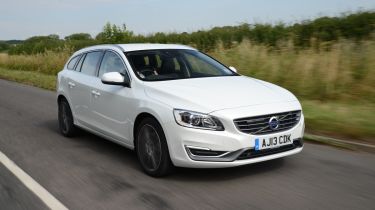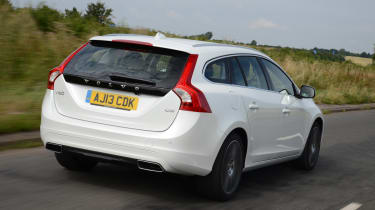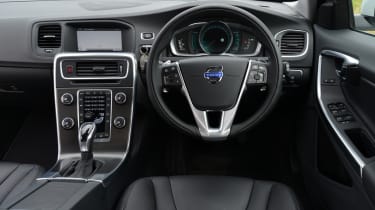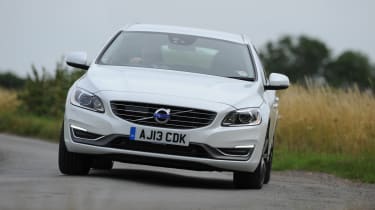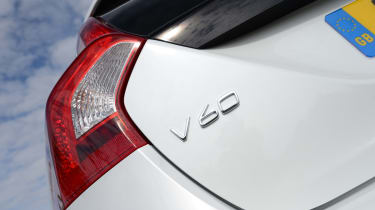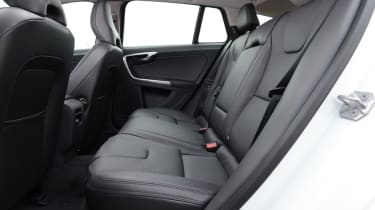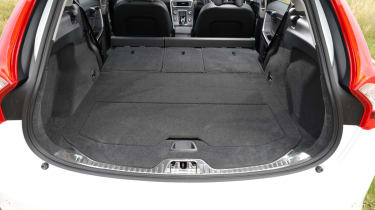Volvo V60 (2011-2018) review
Stylish, comfortable and efficient, the Volvo S60 estate is short on space and driving thrills

The Volvo V60 is the Swedish manufacturer’s smallest estate car, and in spite of its age remains a relatively appealing ‘lifestyle’ variant of the S60 saloon. The model has been offering drivers an interesting alternative to the increasingly ubiquitous Audi A4, BMW 3 Series and Mercedes C-Class ‘executive’ estates since 2011, though with an all new V60 replacement due in 2018 any current V60 lease or purchase deal struck now will have to look especially competitive from the finance point of view.
That said the V60 for sale today was updated in 2014, and still looks fresh. The cabin has an upmarket and luxurious aura too, with a distinctive ‘Swedish’ design style that’s quite different to the Germanic feel of its major rivals.
However, while the V60 is a comfortable and refined cruiser, it can’t match the driving thrills of more modern rivals and neither can it compete for practicality. That swoopy estate body is not configured for maximum load capacity, unlike the boxy Volvo estates of yore. Indeed, if load-lugging is your primary concern, rivals such as the VW Passat Estate and Skoda Superb Estate offer equal quality but lots more room for Labradors or luggage.
There are plenty of different models on offer, with a line-up that starts with the V60 Business edition which is aimed primarily at fleet and company users and features 16-inch alloys, dual-zone climate control, and a 7-inch touchscreen with Sensus Connect and a high performance audio system with CD/DVD player and Bluetooth.
Used - available now
Volvo’s Intellisafe package of City Safety Collision avoidance and Electronic Stability Control is included too. Move up to the SE Nav for 17-inch alloys, leather upholstery and various trim upgrades, or the SE Lux Nav for electric seat adjustment, roof rails, key-less go and active cornering headlamps.
The R-Design Nav and R-Design Lux offer similar specs but with bigger 18-inch alloys, slightly stiffened suspension, dual exhausts and a more sporty feel to the trim and exterior design. while Nav and off-road themed Cross Country variants, all of which are fitted with sat-nav as standard, but can also be specified with a Lux pack upgrade. The Cross Country SE Nav and Lux Nav do much the same things but with raised suspension and more rugged ‘off-road’ design details.
At the top of the range, the V60 Polestar features a 367hp turbo and supercharged four-cylinder engine, four-wheel drive, Brembo brakes and trick Ohlins suspension to deliver track-inspired performance. The downside is its price tag, which nudges £50,000.
The V60 comes with a wide range of engines. There's the 1.6-litre turbo petrol T4 with 190HP and 1.6 D2 120HP diesel, while the 2.0-litre diesel comes as a 150HP D3 or 190HP D4. In addition, there are D5 and D6 Twin Engine plug-in hybrid models. These feature a 2.4-litre diesel, electric motor and battery pack to deliver added efficiency.
Eye-catching looks, an upmarket cabin and diesel engines that blend strong performance and excellent efficiency make the Volvo V60a tempting choice in the compact executive estate class.
However, if it's maximum boot space you're after, the Volvo has to give second best to its German rivals. The driving experience is significantly less engaging than the BMW 3 Series or Audi A4, too. On the plus side, the V60 features a range of modern and efficient engines, as well as an optional eight-speed automatic gearbox. Although it's a pricey option and it doesn't shift as smoothly as its rivals.
The Volvo also boasts a unique Scandinavian style that makes it a refreshing alternative to the Germanic offerings. Unfortunately - and perhaps surprisingly for a Volvo - it’s more compromised on cabin and boot space than most other estates in its class.
Engines, performance and drive
Volvo's estate cars of old aren't known for being especially sporty, but the Volvo V60 is a decent car to drive, if not as fun as the BMW 3 Series Touring. The accurate steering helps it to feel agile and there's a decent amount of grip, but the Volvo doesn't really excel in the corners.
The car's soft suspension set-up means there’s a lot of body roll and keen drivers will also be disappointed by the lack of steering feel. Both the manual and automatic gearboxes aren't up to the standards of the competition. For drivers who just want a comfortable motorway cruiser, however, the V60 could be a great choice.
The V60 is heavy, tipping the scales at 1,628kg - over 100kg more than the 3 Series Touring. This heavy kerbweight is the car’s undoing in corners. Where the BMW is sharp and agile, the Volvo can’t disguise its greater bulk as it rolls through the bends. The suspension crashes over rough surfaces, and never feels very settled at any speed, although the car is fairly refined when cruising the motorway and the seats are supremely supportive.
The steering needs a fair amount of effort and the Volvo has a large turning circle, while the long brake pedal doesn’t feel as responsive as those in its rivals.
All models have good performance, with none feeling weak and the V60 excels on the motorway thanks to the quiet engines as well as super-comfortable seats. If you want a fast estate, then the V60 Polestar is an attractive alternative to the Audi S4 Avant. It has plenty of power, but the slow-shifting auto is a let-down. However, four-wheel drive provides it with lots of grip, and the tailor-made Ohlins dampers deliver a surprisingly comfortable ride that's far more accomplished than the standard R Design model, even though the Polestar has huge 20-inch wheels and super-low profile tyres.
Engines
The Volvo V60 gets a good range of diesel engines, but there’s only one petrol choice – the 190bhp 1.6-litre T4, which does 0-62mph in 6.9 seconds and 140mph.
The V60 Polestar's original 345bhp 3.0-litre straight-six was replaced in 2016 by a 2.0-litre turbo and supercharged four-cylinder with 362bhp.
A revised engine range was introduced in 2014. The smaller D2 now features a 1.6-litre diesel with 120HP. The two 2.0-litre diesels make 150HP or 190HP and are badged D3 and D4 respectively. Even the D2 is reasonably quick, with a 10.8-second 0-62mph time and 121mph top speed. The D4 manages 0-62mph in 7.2 seconds and 140mph, while the D3 is in-between, with figures of 8.6 seconds and 130mph.
The D5 plug-in hybrid uses a 2.4 litre diesel engine but adds a 67bhp electric motor to spice-up performance further with a 6.9-second 0-62mph time.
MPG, CO2 and Running Costs
For the ultimate V60 when it comes to running costs, the diesel-electric plug-in hybrid V60 is the model to have. It gets over 150mpg (at least that’s the figure claimed by the manufacturer), and is exempt from road tax, as well as the London congestion charge. With prices starting around £38k+, however, it definitely won't make sense for the majority of buyers.
At the other end of the spectrum the V60 Polestar performance model only manages 34.9mpg and has emissions that are nearly five times higher than the hybrid's.
We think the 1.6-litre diesel D2 makes a lot of sense for company drivers, thanks to claimed economy of 76.3mpg and CO2 emissions of only 96g/km. If you've got to have a more powerful engine, then the D4 manages to produce emissions of just 104g/km, but also packs 190hp, so it could be the choice for company car drivers in a hurry.
The 1.6 T4 emits 135g/km of CO2, and musters 48.7mpg on the combined cycle which isn’t bad for a petrol model. All the models in the current line-up feature Start/Stop technology to help save money and cut emissions.
As for value for money in the showroom, the Volvo offers plenty of standard kit with cruise and climate control, DAB radio, Bluetooth and auto wipers all included. Heated front seats are a £300 option, though – surprising on a car with Scandinavian roots.
Insurance groups
Insurance costs for the V60 should fall roughly into line with those of the Audi A4 or BMW 3 Series, on a like-for-like performance basis. The only stand-out is the hybrid V60 which falls into Group 41 – the same as the wickedly fast Audi RS4 – because of its high replacement cost.
Depreciation
You should be on to a winner when it comes to reselling your used V60. A couple of years back we rated the model in our top 10 lowest depreciators and while the performance may have slipped a little, demand should still keep used prices relatively high.
Interior, design and technology
The second-generation V60 made its debut in 2011, yet the sleek styling still stands out among its rivals, with its steeply raked front and rear windscreens, small side windows and raised rear end.
A facelift in 2014 added a wider grille and new headlights up front, although the pedestrian-friendly humped bonnet still appears a bit ungainly. At the rear, you get distinctive tail-lamps and a gloss black trim insert at the base of the rear screen. The SE Lux model has 17-inch wheels, a twin-exit exhaust and rear spoiler as standard, but buyers wanting even sportier looks can opt for the R Design version, which is actually slightly cheaper. The top-spec Polestar gets huge 20-inch wheels and an aggressive bodykit to help it stand out from sporty R Design spec.
Climb inside, and the V60 uses Volvo’s familiar design cues. The trademark ‘floating’ centre console has a bank of buttons and features a central keypad flanked by four rotary controls, while lower down is Volvo’s traditional air distribution pictogram that allows you to select which air vents to open.
The cabin features high-grade materials and feels solidly screwed together, but it looks very dated these days next to offerings form BMW and Mercedes. The infotainment screen is similarly old fashioned as well.
Plus, some controls do take a bit of getting used to, and it’s easy to reach for the wrong dial – for instance, retuning the radio instead of adjusting the temperature because the two controls look identical at a glance.
Sat-nav, stereo and infotainment
The ‘Business’ or ‘Nav’ editions are the V60s to go for if you want to feel ‘connected’ as they’re the only ones to include the Sensus Connect package as standard. It brings you access to web apps and an internet browser on a 7-inch display, as well as voice activation, DVD player and a hard disc drive for music.
You can upgrade to a Harman Kardon 12-speaker music system for around £1,000 (or £500 on Business or Nav editions). For around £1,500 you can also opt for a rear seat entertainment package with twin 8-inch screens and DVD players.
Practicality, comfort and boot space
As a comfortable motorway cruiser the V60 excels, with the single caveat around the ride, which can crash and thump annoyingly. The seats are fantastically comfortable, with plenty of support as well as standard height adjustment. With a steering wheel that adjusts in all directions it’s hard to fault the driving position, and noise refinement is excellent too.
The cabin is packed with useful storage, including a large glovebox.
Size
The V60 is 4,635mm long and 1,899mm wide, which makes it 9cms shorter than an Audi A4 Avant and 2mm longer than a BMW 3 Series Touring.
The four-wheel-drive Cross Country model sits just a little higher than its siblings at 1,545mm – the rest of the range stands 1,484mm tall.
Leg room, head room & passenger space
There’s loads of space up front, although, while rear legroom is fine, although headroom in the back is compromised for taller passengers. You can blame that on the car’s sporty roofline, which drops away towards the rear. It’s fine for kids of course, and practicality is further enhanced by front and rear folding armrests housing cup-holders and lidded cubbies. There are also ISOFIX mounts for kids’ seats in the back.
Boot
Volvo traditionally puts utility and safety above all else but with this latest model the stylish design has cut into the practicality more than you might expect. The boot is 430 litres, which is pretty disappointing - it's 60 litres less than the Audi A4 Avant and 123 litres less than the roomy Hyundai i40 Tourer.
A 40/20/40 split rear bench keeps the layout versatile on the inside, but even with all the rear seats folded flat there's only 1,241 litres of space, which is considerably less even than smaller rivals like the Volkswagen Golf and Honda Civic hatchbacks.
On the plus side, the boot is packed with handy hooks and has a 12V power supply, while the front passenger seat can be folded flat to accommodate extra-long loads.
Towing
The Volvo V60 has a small range of towing capacities, helping keep things simple for buyers with towing in mind. Most come with a 1,600kg maximum braked towing capacity, but go for either the D4 or D5 twin engine and you can tow up to 1,800kg.
Reliability and Safety
Volvo has a reputation for building cars that are as sensible as they are safe, and the V60 has been in production long enough for any faults that did exist to have been resolved. This is backed up by our Driver Power 2016 customer satisfaction survey, which placed the V60 in 13th place out of 200 for build quality. However the 127th-place finish for reliability is a disappointment.
Another area where Volvo can’t be faulted is safety. The V60 comes loaded with passive and active systems, including a full set of airbags, side impact protection, anti-whiplash headrests and Volvo’s innovative City Safety low-speed collision prevention system.
SE Lux models also get standard adaptive xenon headlamps with a cornering function. As a result, the V60 bagged a strong five-star Euro NCAP rating in 2012, with a 100 per cent score for its electronic safety assist systems. Adult and child occupant safety ratings were impressive in the NCAP tests too, at 93 and 83 per cent respectively. The latest BMW 3 Series just pipped both those scores by an extra one per cent, and comprehensively beat the Volvo’s pedestrian safety rating by 78 to 64 per cent. The V60 Plugin Hybrid has the same safety rating as the standard car.
Warranty
The BMW 3 Series and the Volvo V60 both offer three-year warranties, the difference being that Volvo will only let you drive the car 60,000 miles if you want to make a claim. You can extend the warranty to four years or 80,000 miles if you want to pay extra, or if you want more warranty for less consider Kia’s seven year/100,000 mile cover.
Servicing
Volvo offers a range of fixed-price servicing deals to keep running costs under control, but you’ll need to speak to your dealer for prices – or check the Volvo website.
More reviews
Car group tests
In-depth reviews
Long-term tests
Road tests
Used car tests
Which Is Best
Most Economical
- Name2.0 T6 [350] PHEV Plus Dark 5dr AWD Auto
- Gearbox typeSemi-auto
- RRP£51,790

